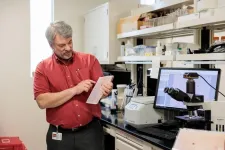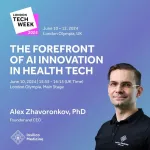Barrow Neurological Institute receives $16.7 million NIH award to help coordinate new national ALS research consortium
2023-10-05
(Press-News.org)
The purpose of the award is to create the Access for All in ALS (ALL ALS) Consortium to conduct clinical research that will include ALS patients nationwide, generating a longitudinal biorepository linked to detailed clinical information that will be made available to research scientists throughout the world using a web-based portal. As part of this new consortium Barrow will manage half of 34 clinical sites in the study which spans the U.S. and Puerto Rico. The consortium will be led by researchers at Barrow, Massachusetts General Hospital and Columbia University.
“Barrow Neurological Institute is honored to be selected by the NIH to help coordinate this important research consortium,” said Dr. Robert Bowser, Ph.D., renowned ALS researcher and Chief Scientific Officer at Barrow, which is part of Dignity Health St. Joseph’s Hospital and Medical Center. “By studying patient-derived biosamples from diverse ALS cohorts, we hope to accelerate the development of effective new drugs to extend life for people living with ALS.”
ALS, also known as Lou Gehrig’s Disease, is a rapidly progressive, ultimately fatal, neurodegenerative disease with about 32,000 cases in the U.S. With an estimated lifetime risk of 1 in 400 people, an average of 5,000 new U.S. cases are diagnosed each year. There are no treatments to stop or reverse ALS progression.
The new consortium will include 34 clinical sites in the U.S. and Puerto Rico. Half of the sites will be managed by Barrow researchers as the West coordinating center and half by researchers at Massachusetts General Hospital as the East coordinating center.
Dr. Jeremy Shefner, Chief Medical Officer of Clinical Research at Barrow, is one of the principal investigators in collaboration with scientists from Columbia University and Massachusetts General Hospital. His team will perform site monitoring activities and training of clinical outcomes for all clinical sites in the consortium. The consortium will provide large-scale, centralized and readily accessible infrastructure for collection and storage of a wide range of data from people living with ALS; individuals at risk for developing ALS; and healthy controls. To foster wide representation across populations, data will be collected from both remote and in person visits, and many clinical sites will be in geographical areas with under-represented minorities. Data will be collected and harmonized in a central data portal, smoothing the path for future research and collaboration across academic institutions and industry.
The Gregory W. Fulton ALS and Neuromuscular Disease Center at Barrow is one of the world’s leading centers for ALS research and patient care. The Institute’s ALS Center has been on the forefront of developing and testing potential treatments quickly and early in hopes of combatting the fatal disease. In 2017, the center was an early adopter of AI technology in partnership with IBM Watson Health to validate the identification of five new genes responsible with ALS.
“Time is of the essence for patients with ALS and we are working to identify new and effective approaches to develop and test new treatments quickly,” says Dr. Bowser. “It’s my hope the Access for All in ALS Consortium will lead us to potentially groundbreaking ALS discoveries and treatments that will extend the quality of life for those living with ALS.”
This research is supported by the National Institutes of Health (OT2NS136939).
END
[Attachments] See images for this press release:

ELSE PRESS RELEASES FROM THIS DATE:
2023-10-05
Many people fail at achieving their early career dreams. But a new study suggests that those failures don’t have to harm your self-esteem if you think about them in the right way.
Researchers found that people who viewed career goal failures as a steppingstone to new opportunities never lost self-esteem, no matter how many times they failed. But those who thought their failures left them worse off showed a drop-off in how they felt about themselves.
“It’s not how many times you have had to give up. It is how you felt about the failures, and whether you thought they led to something better for you,” ...
2023-10-05
Pathology experts engineered an ultrasensitive test capable of detecting a highly specific biomarker found in multiple common cancers
In collaboration with cancer researchers across the country and the globe, the team evaluated the tool’s ability to detect the biomarker in ovarian cancer, gastroesophageal cancer, colon cancer, and other cancers
Diagnostic assays have potential for early cancer detection, monitoring, and prognostics
Marker ‘LINE-1 ORF1p’ is a protein encoded by a human transposon that has further potential applications in tissue diagnostics and may also facilitate treatment of cancers for which no accurate biomarkers ...
2023-10-05
Alex Zhavoronkov, Ph.D., founder and CEO of Insilico Medicine (“Insilico”) will present at the 6th LSX Nordic Conference happening in Copenhagen Oct. 10-11. Zhavoronkov, a leader in generative artificial intelligence (AI) technologies for drug discovery and biomarker development, will present on Oct. 11, 2pm CET on “‘How Artificial Intelligence is Shaping the Future of Drug Discovery, Design, and Development.”
The LSX Nordic Congress is a leading strategy, investment and partnering conference for the Nordic region connecting life science and healthcare ...
2023-10-05
In a recent randomized, controlled human study, consuming grapes for 16 weeks improved key markers of eye health in older adults. The study, published in the scientific journal Food & Function looked at the impact of regular consumption of grapes on macular pigment accumulation and other biomarkers of eye health.[1] This is the first human study on this subject, and the results reinforce earlier, preliminary studies where consuming grapes was found to protect retinal structure and function.[2]
Science has shown that an aging population has a higher risk of eye disease and vision problems. Key risk factors for eye disease include 1) oxidative ...
2023-10-05
When we’re married or in a long-term romantic relationship, we may eventually come to take each other for granted and forget to show appreciation. A new study from the University of Illinois Urbana-Champaign finds that it doesn’t have to stay this way.
The study examined why perceived gratitude from a spouse or romantic partner changes over time, and whether it can be improved through relationship intervention programs.
“Gratitude almost seems to be a secret sauce to relationships, and an important piece to the puzzle of romantic relationships that hasn’t gotten much attention ...
2023-10-05
The 2021 results began a global conversation that sparked public imagination and incited dissenting commentary throughout the scientific community as to the accuracy of the ages.
“The immediate reaction in some circles of the archeological community was that the accuracy of our dating was insufficient to make the extraordinary claim that humans were present in North America during the Last Glacial Maximum. But our targeted methodology in this current research really paid off,” said Jeff Pigati, USGS research geologist ...
2023-10-05
More than 10,000 Pre-Columbian archaeological sites likely rest undiscovered throughout the Amazon basin, estimates a new study. The findings, derived from remote sensing data and predictive spatial modeling, address questions about the influence of pre-Columbian societies on the Amazon region. “The massive extent of archaeological sites and widespread human-modified forests across Amazonia is critically important for establishing an accurate understanding of interactions between human societies, Amazonian forests, and Earth’s climate,” write the authors. ...
2023-10-05
New radiocarbon (14C) and optically simulated luminescence ages have confirmed the controversial antiquity of the ancient human footprints discovered in White Sands National Park, and reported in a study in 2021. Addressing the widespread criticism of their previous study, researchers report that the independent ages from multiple resolved sources conclusively show that the footprints were left behind between roughly 23,000 and 20,000 years ago, demonstrating that humans were present in southern North America during the Last Glacial ...
2023-10-05
In this Special Issue of Science, three Reviews highlight how recent advances in the field of ancient DNA have greatly advanced our understanding of the evolutionary history of many plants and animals, including our own species. “This special issue examines the changing landscape of how ancient DNA (aDNA) is studied today, including previously untapped sources, improvements in technology, and ethical challenges, and what we’ve learned about ourselves though ancient DNA,” write Corinne Simonti and Madeleine ...
2023-10-05
Wastewater release from the Fukushima Daiichi nuclear plant in Japan is expected to have negligible effects on people and the ocean, Jim Smith and colleagues report in a Perspective. The planned releases of radioactive wastewater, 350 million gallons of which has been stored at the site since the 2011 earthquake and tsunami that triggered the Fukushima plant’s meltdown, began in August 2023 and are expected to continue for perhaps the next 30 years. The second release is scheduled to start on October 5th. While the scheduled releases have sparked international concern, Smith et al. discuss the science behind the risks and ...
LAST 30 PRESS RELEASES:
[Press-News.org] Barrow Neurological Institute receives $16.7 million NIH award to help coordinate new national ALS research consortium



